As in most professions in the entertainment industry, people of color have for too long been underrepresented in animation. When creative careers seem like improbable paths, few attempt them – and that those who do don’t know how to get started. How does one get a job in the field? Do you need to know how to draw? Do you need to have attended a renowned art school? How do you break in when you don’t have any contacts?
To break down some of these questions, Disney’s Latinos in TV Animation panel –a session at NALIP’s recent media summit – brought together four accomplished men and women who found unconventional entry points into animation. Francisco Angones (Co-Producer and Story Editor, DuckTales), Pilar Flynn (Producer, Elena of Avalor), Illya Owens (Lead Editor, Mickey Mouse), Jose Zelaya (Character Designer, Mickey and the Roadster Racers and The Lion Guard), and moderator Silvia Olivas (Co-Executive Producer and Story Editor, Elena of Avalor), work for one of the most celebrated and influential brands in the medium, and doing so they prove that doors are slowly opening.
Owens, who is the winner of four Annie Awards (the highest honor in animation), was a teenage mother when she skipped college and found a way into her dream career; Zelaya escaped war in El Salvador and battled bullying with his skills; Flynn chose to use compassion as her main advantage even when told it was a weakness; and Angones pushed so that his children would grow up with a Latino superhero on screen.
No preexisting route applied to them. Instead each took whatever opportunities were present at the time to carve out a space for Latinos in animation. By sharing their sometimes troubled but always uplifting stories, hopefully they inspire others to follow. TV animation is a big component of children’s education, and to have multicultural voices behind it is imperative for a more inclusive society. Of course, they still have to be fun, and in the highlights below you can see that their sense of humor shines through even in adversity.
Pilar Flynn on How ‘E.T.” Made Her Feel Connected to Other People
The first moment I knew I wanted to be in the industry was when I was 6 years old. I remember – I’m Chilena and Ecuatoriana- it was the first time I’d left Chile. We went to visit some family that lived in England. I’d never been in a movie theater before in my entire life and I remember walking in and seeing the grandiosity of this huge theater, all the people lining up, and I didn’t speak a word of English back then. I remember going in and seeing my first movie ever, “E.T.” Even though I didn’t understand a word of what they were saying, I understood every moment in the story, the emotion, the music, and the special effects.
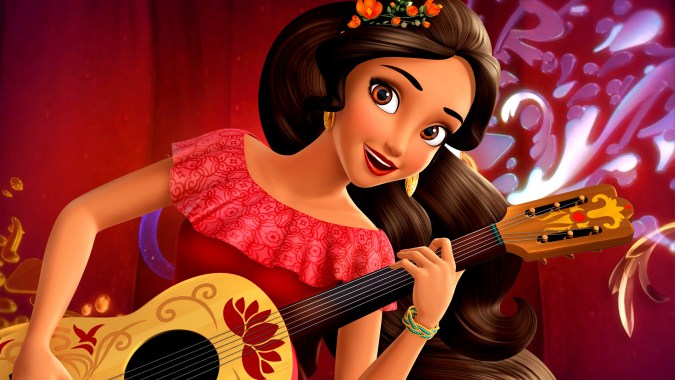
I remember taking a moment to look around and realizing that all these diverse people from different walks of life were experiencing the same emotion as me. At the end when everybody bawls their eyes out, I was bawling my eyes out too. I remember thinking, “Oh my God, this is so powerful. What a beautiful thing that all these people from different areas that don’t know me at all are experiencing the same thing as me right now.” That was the moment when I thought, “Whatever that is, that’s what I’m going to be when I grow up.”
Pilar Flynn on Turning a Weakness Into a Strength
Something that I think is really embedded in me because I’m Latina is my sense of family. For us Latinos family is everything – our lifeline. When I finally decided to come out here to pursue my dream I had to leave all my family behind on another continent. That was really hard, but I think to survive that I just very naturally fell into making my co-workers and my crew my family. I really see them that way. From the beginning they were just my brothers, sisters, and cousins.
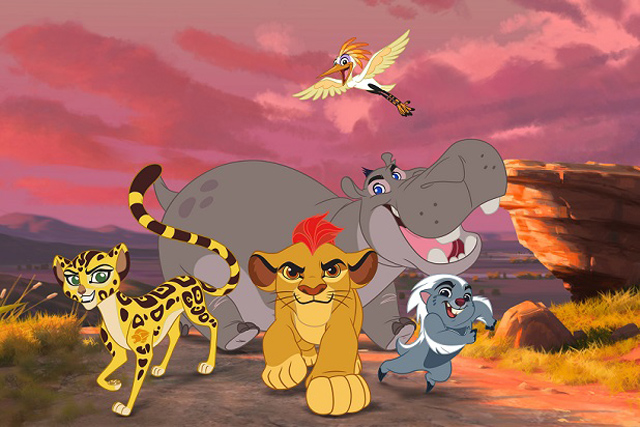
At first as a young PA coordinator I was told that was a weakness. I remember the day my producer and bosses pull me into their offices and told me, “Pilar we have some feedback for you,” and I was like, “What is it?” They were like, “We just want to let you know that you are very smart, you are going to get far here, you work harder than anyone else, you are the last one out, but there is one thing you are going to need to work on. You are not a motherfucker.“ I was like, “What? Is that a bad a thing? I’m so confused?” They said, “ You get too close to the artists.” I remember thinking, “How is that possible? How can you get too close to the artists?” They said, “You got to show them who is boss. You got to get out there and be a jerk.” I was like, “Oh my God, I really want to be a producer. I guess I have to do this.”
I went out there and for one week I tried to be a jerk. That entire week I just felt sick to my stomach. It felt just so unnatural. At the end of that week I thought, “Ok, if that’s what I have to be to be a producer then I can’t do it. That’s not me.” But the second I let that go and I embraced who I was and who I wanted to be, that was when I started getting noticed and that’s when I started getting promoted.
Jose Zelaya on Promising His Mom He’d Work for Mickey Mouse
I discovered art thanks to all the bullies in high school. Once the tough kids realized that I could draw and I did caricatures of teachers, I was in.
I was 7 years old and I remember telling my mom with a drawing of Mickey Mouse, “Mom, one day I’m going to work for Mickey Mouse.” I don’t remember what she said back to me, but I remember the feeling she gave me. She wasn’t like,” If you want to be an artist you are not going to make any money doing that.” She gave me this feeling of security that I could make it. That was always ingrained in me. This was in El Salvador. My mom is such a strong woman. She emigrated during the war because she wanted to give us a better future. She came to the United States.
Jose Zelaya on Being an Immigrant and Rediscovering Art
At the age of 12 I came to this alien world. I didn’t speak any English, colored eyes were so intimidating to me. Imagine being in junior high, where if you speak English it’s tough and if you don’t speak English it’s tougher. I forgot about Mickey Mouse then, but I discovered art again thanks to all the bullies in high school. I remember these tough gangster dudes, I’d never seen that, this was the 90s. It was scary, but once they realized that I could draw and I did caricatures of teachers, I was so in! I knew then that art saved me and that was the one thing I wanted to do for the rest of my life.
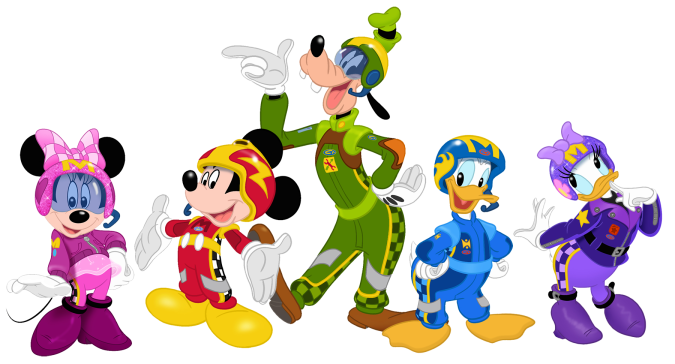
Jose Zelaya on How an Anti-Drugs Program Gave Him an Opportunity
Towards the end of high school the other students wanted to be doctors, pilots, and all these cool things. Being an immigrant you want to do better, so you can help your family. I was like, “What do I do? What do I do? I’m not that good at math.” Luckily, thank God, towards the end of high school there was this anti-drug program where they would teach you how to do animation against drugs, and this was the first time I saw my drawings move and brought life into them. I noticed how the kids that were too cool for school would turn into little kids and become open to contributing. Then we’d come up with this super cool animation where a frog somehow starts smoking and the slogan at the end was, “If you smoke, you broke.” One of the guys that ran the workshop, Bruce Roger, who is one of the most incredible mentors in the whole world for me, put together an animation school in Santa Monica. He gave me a grant to attend it and I learned the basics and the rest is history. My dream came true.
Illya Owens on How a Setback Turned Into an Advantage
I was 19 years old, going to general college and I dropped out of school. Why did I drop out of school? I was pregnant. I decided to have this baby in my life, and I didn’t know what I was going to do. I always knew I wanted to be in the industry. I was taking film classes but I didn’t know what to do once I had a baby. I went to talk to my photo teacher at school. I was like, “I know he’ll know what I should do right now,” and and he was like, “Ilya you need to learn Photoshop.” This was in 1996 and I was like, “Ok, what’s Photoshop?” It just had come out. I took a UCLA extension course and I learned Photoshop. I ended up getting my first job in an animation as a scanner. I would scan the drawings from all the artists, label them, and crop them. Those were my Photoshop skills back then.
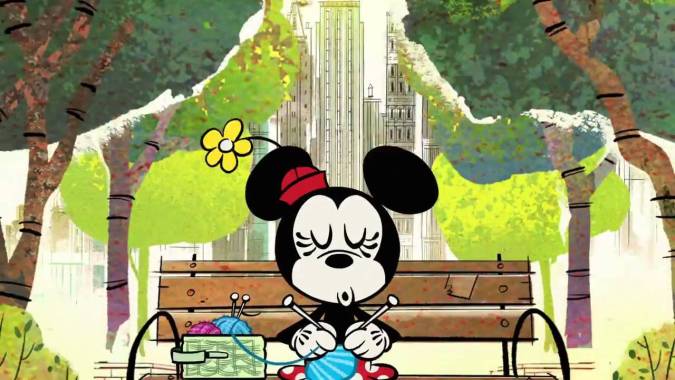
I was at Sony TV Animation at the time and I was in a room with a lot of animatic editors, and I just started learning. My setback of not going to school actually paid off for me. I’m not recommending that route for anybody. I would admit that I don’t like telling people that I didn’t go to college. It makes me feel like I didn’t do something. I went to animation school in the industry. I worked my way up. There were opportunities in front of me and I took them: “You want to learn this software?” and I’d learn it. I felt so fortunate because I really loved animation and I didn’t know that I could be an editor. I thought to be in animation you needed to be someone that drew. I didn’t know all the other things that I could do. I joke around, but animation saved my life. I was able to learn a skill, I was there, I was present, and 20 years later I still love what I do. It was the happiest accident. My setback was actually a blessing.
“I wrote Lin-Manuel Miranda a letter. I said, “Look, I love Disney, I love Marvel, I love superheroes in general, there is not a Latino superhero in the multiplex at all. I want my kids to have one and I can do that.”
Francisco Angones on His Abuelo Lying to Him for a Good Reason
When I was a kid, I grew up in Miami, three blocks from Little Havana. I gave a presentation at my grade school, in fourth grade, it was supposed to be on “Famous Latino Figures.” I talked to my abuelo and he said, “You should do Walt Disney.” I got a D on my presentation because Walt Disney was not Latino. But I realized what he was doing was trying to appeal to me because I was this pop culture junkie kid. My abuelo told me Superman was an immigrant. My abuelo told me most of the people that ran for president in 1984 were secretly immigrants. He’ll say, “Walt Disney, Hollywood made him change his name.” He just wanted me to be invested in our culture and our heritage.
Francisco Angones on Convincing Lin-Manuel Miranda to Be on DuckTales
I loved comic books growing up, but being a Latino kid in the 80s reading comic books, we had [only] one superhero. We had Vibe, the DC Comics superhero. He is a gang member who has break dancing powers. That’s not a sterling example of Latino diversity. He’s been rehabbed. He is great. But when it came time to do DuckTales, the character Gizmoduck is the main superhero character, like Peter Parker meets Iron-Man. and I was like, “God, wouldn’t it be cool if he was Latino? Wouldn’t it be cool if it wasn’t just the token superhero character but if he was the main superhero in DuckTales?”
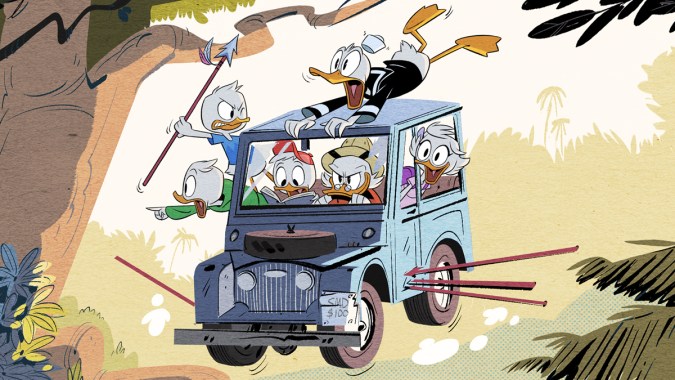
We looked at the character and we did this interesting revamp of him. In the original series he was this kind of nerd who had a million ideas at once. He was an accountant that wanted to work for Scrooge McDuck and he talked his way into every situation and spoke very quickly. He was brilliant, but kind of a dupe, and earnest and lovable. I was like, “That sounds like Lin-Manuel Miranda.” Stupidly, I wrote the character as if it was Lin-Manuel Miranda and I wrote this letter to him. I explaining to him about how I got a D in that presentation and I said, “Look, I love Disney, I love Marvel, I love superheroes in general, there is not a Latino superhero in the multiplex at all. I want my kids to have one and I can do that.” I knew he had a kid and I told him, “Wouldn’t you like that?” I didn’t know at the time that he was also a massive DuckTales fan. We sent him the letter and he said yes. He is recurring on our show as Fenton Crackshell-Cabrera now. We record him at 2:00 AM because he is a very busy man, but it’s amazing.




